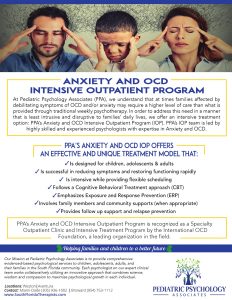 Call us
Call us
South Florida Community,
New York & Connecticut
(305) 936 - 1002
Anxiety and OCD Intensive Outpatient Program (IOP) Treatment Option
At Pediatric Psychology Associates, we understand that at times a patient may require a higher level of care than traditional weekly psychotherapy can provide. In order to address this need, we offer a treatment option that is more intensive, yet still provides care in a manner that is least intrusive and disruptive to families’ daily lives. The Anxiety and OCD Intensive Outpatient Program (IOP) aims to help individuals and families reduce symptoms and restore functioning more rapidly.
When individuals with an anxiety or obsessive-compulsive disorder experience very high levels of interference in their daily lives (e.g., difficulty going to school or work), and traditional treatment methods have been tried with limited success, we may recommend the IOP treatment option. Our intensive treatment approach follows an evidence-based model that is grounded in cognitive behavioral therapy (CBT) and utilizes exposure and response prevention (ERP) techniques. The program offers a higher level of treatment intensity in order to help individuals and families learn to manage extreme anxiety-driven avoidance behaviors.
Types of problems addressed in intensive treatment
Obsessive-Compulsive Disorder (OCD)
Specific Phobias (e.g., fear of vomit, school-related phobias)
Separation Anxiety
Panic Disorder
Agoraphobia
What does intensive treatment involve?
Intensive treatment typically entails meeting with a clinician several times a week. The schedule and frequency of sessions will depend on the results of the assessment and recommended treatment plan. Sessions for IOP will range between 3 to 10 units per week. Sessions units are 45 minutes; the number of units, appointment times, and days will be scheduled depending on the timeframe permitted and presenting circumstances. Treatment will primarily take place in the office and/or telehealth; however, treatment may also take place in other environments.
During the first few days of an intensive treatment, the focus will be on providing psycho-education about anxiety and its treatment. In other words, patients will gain an understanding of the nature and causes of anxiety, and most importantly – they will learn about the factors that maintain their anxiety. This information is an important foundation to begin the journey toward beating anxiety. Patients will also learn to use cognitive strategies to begin to question and change faulty, anxious thoughts. In addition, patients will be taught adaptive coping skills (e.g., mindfulness, relaxation techniques) to help them learn to manage distress without relying on maladaptive behaviors, such as avoidance.
The clinician and patient will then proceed to the most critical component of treatment: exposures. During exposures, patients learn to gradually face feared stimuli and situations in a supportive and empowering environment. Importantly, patients will be coached to resist the temptation to engage in avoidance behaviors and/or compulsive rituals during exposures. With repeated exposures, patients gradually learn to face the previously feared situations more comfortably, without engaging in avoidance behaviors and/or rituals and compulsions.
Intensive treatment can be stressful at times, but in both our clinical experience and the scientific literature, it has been shown to be an effective treatment for youth and adults with severe anxiety disorders. To help provide a buffer against treatment and other-related stress, it is important that patients and families engage in adequate self-care (e.g., carve out time to relax and unwind). Your clinician will work with you to develop a plan to engage in appropriate self-care throughout treatment.
Intensive treatment with children and adolescents
When working with children and adolescents experiencing severe anxiety, clinicians will work closely with parents and primary caregivers. In addition, clinicians may work with teachers and other school staff as appropriate. Throughout treatment, an important goal is for caregivers to understand the rationale for treatment and specific techniques being used in order to provide appropriate support for the child between sessions and once treatment has ended.
What happens after an intensive treatment?
Anxiety disorders are complex; although patients typically see significant improvement in symptoms and functioning over the course of an intensive treatment, careful thought and consideration is given to how to maintain and increase the gains made in treatment. Individuals and families will work with their therapist to identify the best treatment plan moving forward. Often, recommendations are made to continue weekly psychotherapy sessions for a period of time. If the patient was previously receiving weekly CBT psychotherapy from another therapist, the clinician from the intensive treatment will help to facilitate the transition back to the referring therapist. The focus of this phase of treatment is often to help the individual continue to use the skills learned during intensive treatment in their everyday lives, to quickly identify and address new problems that arise as a result of anxiety, and to recognize when professional help might be needed again.
How do I start an intensive treatment?
If you believe you or your child might benefit from this type of intensive treatment, please contact our office so that we can schedule a diagnostic assessment that will help us determine the appropriate level of treatment. You can contact us via phone or e-mail: (305) 936-1002; info@mailppa.com







